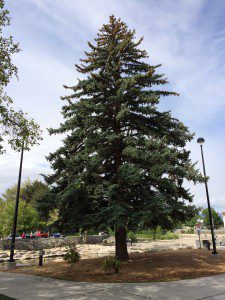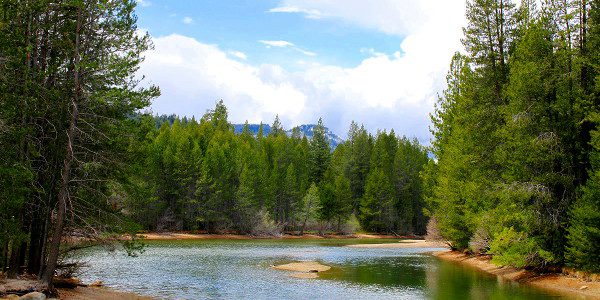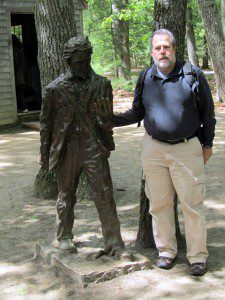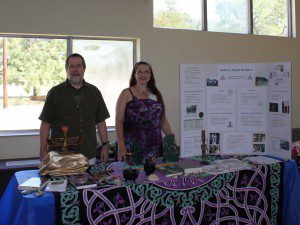Wrestling With the Gods
So how do we engage these Big Questions of Life? How do we wrestle with Gods and angels? With regular, dedicated, spiritual practice.
We start with basic practices like meditation. You can take a Zen Buddhist approach and just sit. Focus on your breath, and if your mind starts to wander, gently return to focusing on your breath. This is practice is very simple – it’s also very hard. But it helps train your mind to focus on the matter at hand, which helps you deal with life’s Big Questions without making them more complicated than they are.
 I’ll be honest – I struggle with this type of meditation. Not every person is well-suited for every type of spiritual practice. I have far more success with contemplative meditation. I’m a Pagan – I may decide to contemplate a tree in my back yard. Or the Forest God Cernunnos. Or my ancestors who first came to the New World, or who first walked out of Africa. Or I may decide to focus on one of the Big Questions of Life. It helps to have an image to focus on: a statue, a picture, a candle, or an actual tree. It’s hard to meditate outdoors in Texas this time of year, but it can be done, and in cooler weather it’s wonderful. Let your mind go where it will… though if it starts wandering to what you’re having for dinner, bring it back to the object of your focus.
I’ll be honest – I struggle with this type of meditation. Not every person is well-suited for every type of spiritual practice. I have far more success with contemplative meditation. I’m a Pagan – I may decide to contemplate a tree in my back yard. Or the Forest God Cernunnos. Or my ancestors who first came to the New World, or who first walked out of Africa. Or I may decide to focus on one of the Big Questions of Life. It helps to have an image to focus on: a statue, a picture, a candle, or an actual tree. It’s hard to meditate outdoors in Texas this time of year, but it can be done, and in cooler weather it’s wonderful. Let your mind go where it will… though if it starts wandering to what you’re having for dinner, bring it back to the object of your focus.
My best contemplative meditation isn’t done sitting – it’s done walking, particularly outdoors, early in the morning, in that magical liminal twilight just before sunrise, and just after.
Contemplate the Big Questions of Life. Don’t try to figure them out logically – there will be plenty of time for objective analysis later on. For now, just see where your mind and your soul take you. Listen to yourself – what do you really believe? Not what you’ve been told you’re supposed to believe and not what everyone expects you to believe – what do your heart and mind and soul tell you is true? Acknowledge it. Honor it. Explore it.
The practice of prayer has somewhat of a uneven reputation in Unitarian Universalism. Some of us doubt the efficacy of prayer. Others have been turned off by supposedly spiritual people whose prayers resemble the Christmas list of a four-year-old, by those who pray for the harm of their political opponents, and by those who pray only when they find themselves in trouble.
Most of these are not criticisms of prayer itself but of how we choose to pray. There are at least three forms of prayer that are always valid and always helpful in our attempts to develop a deeper spiritual practice and a more meaningful life.
The first is the expression of gratitude. Offering our gratitude reminds us we owe much to our families and communities, to our ancestors and predecessors, to those who grow our food and to the natural world in which we all live and breathe. It reminds us to “count our blessings” and to recognize that no matter how difficult any given day may have been, we still enjoy much. It did not have to be this way, but it is, and for that we can be thankful.
 Another form of prayer is devotion. Do you love Nature? Then say so. Do you love your grandmother who died when you were very young and whose memory is dear to you? Then say so. Do you love justice? Then say so. Devotional prayer does not ask for anything and it does not attempt to pay a debt for the good things we’ve received. Devotional prayer simply says “this is who and what I love – this is who and what I want to be in relationship with.”
Another form of prayer is devotion. Do you love Nature? Then say so. Do you love your grandmother who died when you were very young and whose memory is dear to you? Then say so. Do you love justice? Then say so. Devotional prayer does not ask for anything and it does not attempt to pay a debt for the good things we’ve received. Devotional prayer simply says “this is who and what I love – this is who and what I want to be in relationship with.”
A third form of prayer is the expression of the desires of our hearts. What do you want most in life? What will truly bring you satisfaction? If you really think – meditate, contemplate – about what is most important to you, then those Christmas list prayers will fall away and will be replaced by matters of ultimate importance.
Prayer has been an important and fulfilling spiritual practice for thousands of years. Don’t let some people’s bad examples keep you from incorporating it into your own practice.
A spiritual practice that comes easy to many UUs is reading. People have struggled with the Big Questions of Life for thousands of years, and some of them have come up with some pretty good answers. Or at least, some answers that may be helpful to you.
There is wisdom in the holy books of the world – there’s a lot of unhelpful stuff in them as well. They were not written by infallible Gods but by deeply flawed people. They reflect the world as they knew it at the time, and the cultures in which they lived. Discernment is required, but you’re a good UU – you can tell the difference between eternal wisdom and cultural assumptions that no longer apply.

There is wisdom in the works of philosophy. Read Socrates and Plato. Read Emerson and Thoreau. Read Walt Whitman and John Muir. Read some of our contemporary philosophers, many of whom are cleverly disguised as activists and social commentators.
And when you read them, talk about them. Not only does talking about theology and philosophy help us understand them better, it helps to promote the development of these ideas in the wider world.
In his book The Earth, The Gods, and The Soul, philosophy professor and contemporary Druid Brendan Myers argues – successfully, I think – that without institutions to support them, philosophical ideas stagnate. Speaking of Pagan philosophy, he said:
From the sixth century, when the Neo-Platonic philosophy schools were closed [because they were seen as a threat to Christianity], to the middle of the twentieth century when the modern Pagan movement began, we find Pagan arguments and commentaries upon those arguments. But we do not normally find an ongoing exchange of argument, counter-argument, criticism, counter-criticism, improvement, adaptation, correcting of mistakes, and widening of application … Without organizational support, ideas tend to take the form of strongly and/or poetically expressed propositions, and rather little else.
We have the institution of Unitarian Universalism. Let’s use it to promote the development and exchange of religious and philosophical ideas.
The explorations of these ideas help us form our own answers to the Big Questions of Life. Our answers give us the confidence we need to face illness, loss, and death with dignity and integrity. And they give us the motivation and inspiration we need to go out and help others do the same – to build our beloved community right here, right now. Our spiritual practices teach us to feed ourselves, so we have the energy to go out and feed others.
Our Unique Opportunity as UUs
And that brings us to a very special place we occupy as Unitarian Universalists. We don’t just have access to one religious tradition, we have – in the words of our third source – “Wisdom from the world’s religions which inspires us in our ethical and spiritual life.” In this church we have Buddhists and Pagans, Christians and atheists, and a lot of people who are hard to classify and damn proud of it. Over the years we’ve come together many times to support issues and projects that make our community and our world a better, more fair, and more compassionate place.
Yet our ability to come together on the Big Questions of Life is limited. To cite the most obvious example, some of us believe in many Gods, some of us believe in one God, and some of us believe in no Gods. Both the approaches we take and the answers we develop will be different.
That’s OK. In the words of 16th century Romanian Unitarian Francis David, “we need not think alike to love alike.” Further, we need not downplay the differences in our religious thinking. Some of you are Unitarian Universalists and nothing else. That’s wonderful. But I’m a Pagan and I’m a Unitarian Universalist. Some of you are Buddhists and you’re Unitarian Universalists. Some of you are atheists and you’re Unitarian Universalists. We can be both fully one and fully the other.
In the most recent issue of UU World, UUA President Rev. Peter Morales said “the future of liberal religion is multifaith.” He said
the major religious divisions today are no longer between faiths, but rather along the spectrum from reactionary to progressive. For example, it has long been obvious that progressive Jews, Christians, and Muslims have more in common with one another and with Unitarian Universalists than they do with the most reactionary members of their own faith.

There are some who think “multifaith” means watered-down liberal Christianity, maybe with a little Buddhism thrown in. But Denton UU has been a multifaith congregation for many years. And we’ve done it the right way, by encouraging people to find spiritual depth in the traditions that call to them. We’ve come to expect to not just be informed by religions of our friends, but to be challenged by them as well.
What feeds your soul? What helps you deal with the Big Questions of Life? Is it the way of the Buddha? Is it the teachings of Muhammad? Is it dancing beneath the full moon? Whatever approach calls to you, there’s a place for you here at Denton UU. Feeding our souls and caring for ourselves is one of the obligations of good religion.
And when we care for ourselves, we’re equipped and energized to care for the world and to build our beloved community, right here right now.
Benediction
As we leave this place and return to the ordinary world, let us remember the two obligations of good religion: to heal the world and to heal ourselves. To be focused on the world out there and the world within. To feed others and to remember that we need to eat too.
Go in peace, but first turn and greet those around you, in particular those you do not know.
















